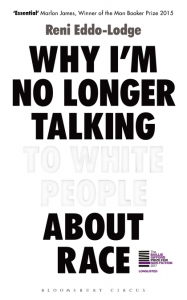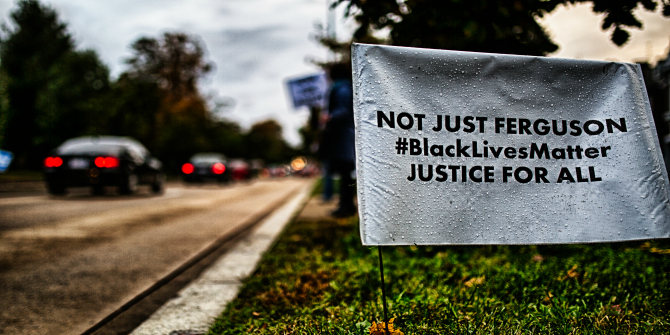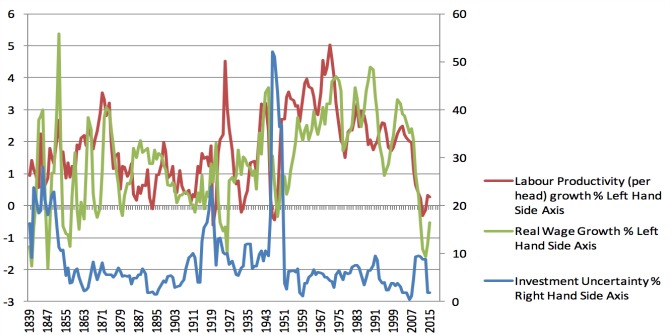When was the last time you heard a person of colour challenge structural racism – the role of government policies, organisational practices and popular representations in reinforcing racial inequalities – and, in so doing, be widely supported, listened to and heeded? Racial inequalities are stark, yet normalised. White people are privileged yet complacent, and refuse to listen. In her phenomenally brilliant new book, Why I’m No Longer Talking to White People about Race, Reni Eddo-Lodge catalyses an urgent conversation about race in Britain, writes Alice Evans.
Why I’m No Longer Talking to White People about Race. Reni Eddo-Lodge. Bloomsbury. 2017.
 This is the most important book I’ve read in several years. It’s beautifully written, powerful, moving and rightly distressing. As such, this review will be a little unusual. I will not critique the book (as I have others on this site). This is partly because I am entirely convinced, and partly because that would be fundamentally missing the point. We (white people) stand accused of wilful ignorance; of refusing to recognise structural racism; and of indignantly shouting down proposed reforms. We urgently need to start listening to people of colour, reflecting on our practices and doing far better.
This is the most important book I’ve read in several years. It’s beautifully written, powerful, moving and rightly distressing. As such, this review will be a little unusual. I will not critique the book (as I have others on this site). This is partly because I am entirely convinced, and partly because that would be fundamentally missing the point. We (white people) stand accused of wilful ignorance; of refusing to recognise structural racism; and of indignantly shouting down proposed reforms. We urgently need to start listening to people of colour, reflecting on our practices and doing far better.
To build empathy and understanding, Reni Eddo-Lodge traces our British history of slavery, lynchings, police brutality and the enduring obstacles that reproduce inequalities in education and employment. To my shame, much of this information was new to me. I did not know that after the First World War (typically memorialised as unity against a shared foe), there were racist lynch mobs in Liverpool and Cardiff. Further, rather than protect the victims, our government repatriated 600 black people, notwithstanding their contributions to the war effort.
Hatred, hostility and police brutality continued in the twentieth century, as Eddo-Lodge eloquently narrates. Yet politicians, films and news media have typically portrayed black (not white) people as violent threats. And that was the myth I grew up with as a child. Kept in a white, established middle-class enclosure, seldom seeing black men in positions of authority or expertise, I distinctly remember fearing them. Eddo-Lodge sees this, perfectly.
Thankfully, I went to an international school, where I interacted with people of colour, recognised our commonalities and stopped making these ignorant, racist assumptions. But like many other characters depicted in Eddo-Lodge’s book, I remained shamefully blinkered to my white privilege. I arrogantly assumed that I was succeeding in school, gaining internships and other wonderful opportunities through hard work and merit alone. I was blinkered to the truth: the obstacles, the hurdles, at each and every single stage, that thwart black lives in Britain. Even if black workers endure and excel, overcoming a system rigged against them, the pay gap widens with A-level qualifications.
 Image Credit: (Johnny Silvercloud CC BY SA 2.0)
Image Credit: (Johnny Silvercloud CC BY SA 2.0)
And let’s be honest, this isn’t news. As Eddo-Lodge details, we see structural racism every day: most kids who live above the fourth floor of tower blocks are black or Asian. Meanwhile, white people are over-represented in academia, senior management, politics and films. As a philosophy undergraduate, I only read books and papers by white men. I never questioned this.
To build a fairer Britain, we urgently need to start talking about race. Yet, Eddo-Lodge highlights that when people of colour do speak out – pushing for decolonised curricula, affirmative action, short-lists, black film stars – they’re shouted down and vilified. Any attempts to diversify (Idris Elba as James Bond, a black Hermione Granger) are roundly condemned. Cue indignant outrage that Britishness might not always be represented as white. To protect and preserve themselves from these unrelenting attacks, some people of colour want ‘safe spaces’. This is a mistake, explain paternalistic white people. They proceed to tell others who endure profound racism to ‘toughen up and grow a thicker skin’. Indeed, their closed-mindedness seems rather racist … As Eddo-Lodge remarks, we are more outraged by accusations of racism than racism itself.
White solidarity was publicly asserted last week, when Dr. Priyamvada Gopal and others questioned Professor Mary Beard’s remarks about Haiti. Rather than listen and learn from alternative perspectives, many white people defended their hero, and tarred interlocutors with the ‘angry black woman’ stereotype in a bid to delegitimise their critique.
Mary Beard isn’t being silenced. People called her out and there’s a huge difference. Lots of black women called her out. But it seems you have no problem silencing us. Are we not women too? Or are we the wrong kind to illicit any sympathy from you? https://t.co/t1vfSoNRcO
— No such thing as BAME 🇩🇲🇧🇧#FatAndRound (@thetwerkinggirl) February 18, 2018
Now, you may be thinking: ‘Sure, those white people are awful. But I’m different. Far from decrying diversity, I welcome it. My favourite film this year is Black Panther!’ Fine, good for you. But does your solidarity go beyond individual consumerism? For instance, when you saw the Telegraph’s nasty smear campaign against Lola Olufemi, did you write to complain, mobilise to protest or just sigh and turn the page?
White British people have greatly benefitted from structural inequalities. Pervasive racism means that we are favoured – in education, employment and politics. And we allow this to persist. As Eddo-Lodge surmises:
White privilege is dull, grinding complacency. It is par for the course in a world in which drastic race inequality is responded to with a shoulder shrug, considered just the norm […] Everyone is complicit, but no one wants to take on responsibility.
Guilty, as charged.
Going forwards, Eddo-Lodge calls for us to listen intently, learn from marginalised perspectives, intervene as bystanders and collectively address profound inequalities. She emphasises that, collectively, we have the power to create the world we want to live in. Racial equality is not a spectator sport. Although inequalities are systemic, change starts with us.
Why I’m No Longer Talking to White People about Race should be compulsory reading in all schools. It is the building blocks of a fairer Britain.
______
Note: This post was originally published on our sister site LSE Review of Books.
About the reviewer
Alice Evans is a Lecturer in the Social Science of Development at King’s College London. She researches inequality, social change and global production networks.
All articles posted on this blog give the views of the author(s), and not the position of LSE British Politics and Policy, nor of the London School of Economics and Political Science.








“Does anyone really think its ok to promote a position where you do not intellectually engage with people because of their ethnicity?”
If you have read the book, you should know this is not the author’s position or argument. I believe you have made your critique based on the provocative title and not on any reading of the book.
In her book she writes:
…… It was never written with the intention of prompting guilt in white people, or to provoke any kind of epiphany. I didn’t know at the time that I had inadvertently written a break-up letter to whiteness. And I didn’t expect white readers to do the Internet equivalent of standing outside my bedroom window with a boom box and a bunch of flowers, confessing their flaws and mistakes, begging me not to leave. This all seemed strange and slightly uncomfortable to me. Because, in writing that blog post, all I had felt I was saying was that I had had enough. It wasn’t a cry for help, or a grovelling plea for white people’s understanding and compassion. It wasn’t an invitation for white people to indulge in self-flagellation. I stopped talking to white people about race because I don’t think giving up is a sign of weakness. Sometimes it’s about self-preservation. I’ve turned ‘Why I’m No Longer Talking to White People About Race’ into a book –paradoxically –to continue the conversation. Since I set my boundary, I’ve done almost nothing but speak about race….
So the book then goes on to argue the case and then engage….
What a depressing book and even more depressing that the reviewer thinks it should not be criticised. I couldnt really find an argument for the reviewer’s position.
Does anyone really think its ok to promote a position where you do not intellectually engage with people because of their ethnicity? Lets call this what it is – racism. But even though the author is promoting a racist position I still think its important to engage with her and be polite and civil.
Does the author have any good arguments for this position? Perhaps someone could mention one? The whole idea of a free open society is that you argue and debate with people who you disagree with, however frustrating when individuals or whole groups seem to disagree with you.
The logic of the author’s position is that is someone feels a sense of injustice and other people dont agree with them, then they can retreat from debate and give up – perhaps pointing the finger at them and slinging some labels.
One of the commentators said this….
” It should be critiqued, for discussions to be furthered, but from a person of colour – one who has experienced racial prejudice”
Its simply incoherent and if applied more widely would devastate intellectual life. No position should be immune or sheltered from criticism.
I really do think that you have missed the point of the book entirely and you have fallen into one of the things the author highlights. Instead of critiquing or making a comment based on the racism in our society you have decided to have as your main argument that the author is racist. The author cleverly chose that very title as it is meant to portray the complacency many white people have when approached or confronted about their privilege. I don’t believe it is meant to be taken literally but it is used to evoke the attention of the “liberal white people”, who suddenly get defensive when talking about race.
If you distribute this book in schools I suspect it will have the opposite effect to the one you want.
“White British people have greatly benefitted from structural inequalities”.
Really? All of them? I am not so sure. For example, I think it would be difficult to apply that characterisation to the white British people I grew up amongst on a council estate in an obscure mining town in northern England, amidst the mass unemployment that accompanied the decline of heavy industry. In what way have those white people benefitted from structural inequalities?
A good review of this book would ask some awkward questions. Too what extent might the injustice being highlighted stem from class inequality rather than racism? As it is the reader is left with a simple restatement of the book’s core message rather than any critical evaluation of it. Even if the author is “entirely convinced” by the case the book puts forward opposing arguments should be addressed; even if they are ultimately found to be wanting.
Someone with the academic credentials the writer of the above has should be providing the reader with the benefit of her critical faculties. She should be using her knowledge of the field to give the reader a sense of what contribution the book is making to general understanding of the topic. That includes an assessment as to where the book sits in terms of the ongoing debate. That should include consideration of more critical views.
Instead what we have is a puff piece. An advert. Personally I expect more from pieces published here.
I’d be interested to hear your thoughts after you have read the book rather than the review – as Eddo-Lodge is very deft at predicting and rebutting the common responses people of colour receive from white people when it comes to talking about race. I think the reviewer has, therefore, made the correct call in this instance in allowing the author to make these points herself.
She talks in depth about class and racism and these passages I feel you’ll find interesting and stimulating. White privilege doesn’t equate to a privileged life in the sense we commonly assume. You can be poor or homeless even, and you still have better life chances than a person of colour in the exact same situation.
Agreed, it is an enlightening book, and I believe that you are correct in not critiquing it; this would have missed the point. It should be critiqued, for discussions to be furthered, but from a person of colour – one who has experienced racial prejudice.
Structural racism inherently subjects people of colour to a low socio-economic position. However, to what extent do you believe it is present once a person of colour has lifted themselves out of a economic hardship? Does it subside?
I am aware that this comment trivialises the struggle of lifting oneself out of socio-economic hardship, it is a challenge that this comment cannot capture but is done elloquently in the reviewed book.